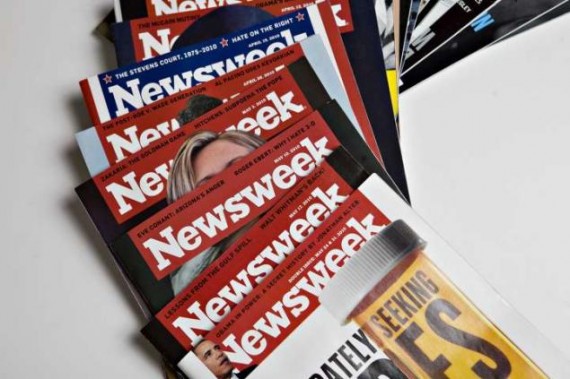Newsweek Returning To Print
Just over a year after going all-digital and publishing its last print edition at the end of 2012, Newsweek is, for some reason, returning to the print world:
Newsweek, the struggling weekly magazine that ceased print publication last year, plans to turn the presses back on.
The magazine expects to begin a 64-page weekly edition in January or February, said Jim Impoco, Newsweek’s editor in chief. Mr. Impoco said in an interview that Newsweek would depend more heavily on subscribers than advertisers to pay its bills — and that readers would pay more than in the past.
“It’s going to be a more subscription-based model, closer to what The Economist is compared to what Time magazine is,” Mr. Impoco said. “We see it as a premium product, a boutique product.”
Newsweek’s return to print is a positive sign for a magazine that struggled mightily in the digital age. At its height in 1991, the magazine had 3.3 million readers. In 2010, Newsweek’s owner, The Washington Post, sold it to the billionaire investor Sidney Harman for $1. Mr. Harman, who also assumed $40 million in liabilities, then merged it with The Daily Beast, the website owned by IAC/InterActiveCorp.
The editor Tina Brown took control of the combined titles, but the venture failed. The traditional Newsweek never properly blended with The Daily Beast. Ms. Brown announced in October 2012 that Newsweek would no longer publish a magazine, saving $40 million a year, and would continue as an online-only magazine called Newsweek Global.
(…)
Mr. Impoco, who became Newsweek’s editor in September, said that the magazine’s new owner would not have to spend as much money publishing it as its predecessor. He said that IBT was negotiating with printers and distributors, and hoped that it would build its circulation to 100,000 in the first year.
This seems like an odd move at first glance. Given the 365/24/7 news cycle, the relevance of weekly news magazines in today’s media world is questionable at the very least, as the decision by U.S. News and World Report to leave the print world even before Newsweek did would seem to confirm. Time Magazine continues to hang on, but that may just be a reflection of the fact that there really is room for only one mass marketed news weekly in the U.S. market. Additionally, the idea that Newsweek is going to be a serious competitor to The Economist seems rather optimistic to say the least.







Hmm. If I was in the US, I would probably try it for a year and if the quality was good, keep it up. No offense Doug, but while bloggers have their benefits, they really aren’t a substitute for good reporting and especially editing. When something happens that I want to know about, I go to the NYTimes, and deliberately avoid the blogs, as they are very likely to have posts that are flat wrong and changed every five minutes. A blogger is likely to link to some Heritage foundation drek as if it was on par with real research. And, Doug, you have to admit that quite a few of your posts quote extensively (and I mean – EXTENSIVELY) from traditional journalism. I pay for exactly three news sources: NYTimes, Andrew Sullivan (totally a blogger, but almost unique in breadth and outlook) and I still support my local NPR station although I don’t listen to it as much now that I’m living overseas (although thanks to the internet it’s not that hard to catch).
If more blogs starting charging for content? Well, maybe Kevin Drum and the American Conservative, but Outside the Beltway, Talking Points Memo, Moneybox, Wonkblog? Not so much.